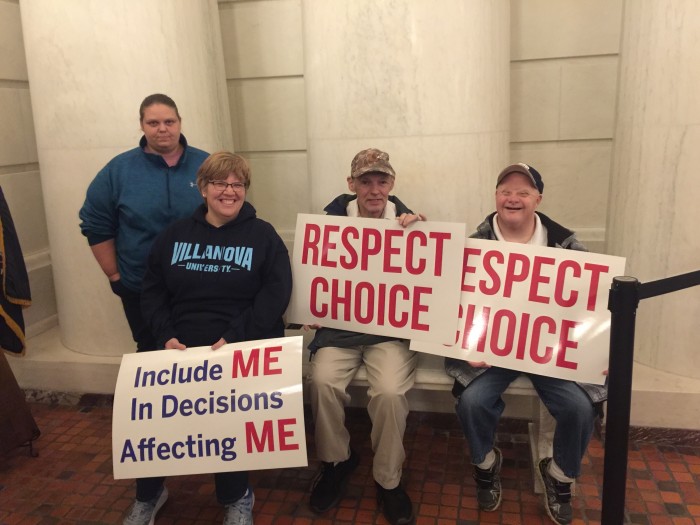Council on Reform Public Comments Due December 16
As we approach the conclusion of the Governor’s Council on Reform public comment period on December 16, 2019, RCPA would like to ensure that each member has the materials for providing their public comments, feedback, and support. RCPA will be submitting commentary within each policy director’s purview, and we strongly urge your agency to submit your thoughts to the Council, including areas and issues that may not be represented in the current recommendations.
If you would like to send your submissions to your respective policy director for inclusion in the RCPA public comment, please have them submitted by close of business on Wednesday December 11, 2019.
Below you will find the links to important documents relating to the Council on Reform, including the Public Comment Submission Form. If you have further questions, please contact your respective RCPA Policy Director.
Thank you for your efforts and partnership to bring these recommendations to the forefront of your work.
DHS Secretary Notes Changes to Clearances for Employees Having Contact w/Children
Tentative Minimum Wage Deal in the Works
Talk in Harrisburg is that the Pennsylvania Senate and Governor Tom Wolf are tentatively moving towards gradually increasing Pennsylvania’s minimum wage to $9.50/hour in the next 18 months to two years. The tentative proposal would increase the state’s minimum wage by $2.25 from the current rate of $7.25.
Additionally, the tentative proposal would also prevent the Governor from taking action on a proposed rule to expand overtime to low level managers for the next two years, until after the next governor is elected. State business groups, such as the PA Chamber, may not fight this compromise so long as the overtime expansion is tabled and businesses receive assurances from the Governor that he will allow other employer/employee wage reforms to go through the legislative process and sign those reforms into law.
The deal is still in its infancy and the PA House will have to agree to the proposal. Stay tuned!! Questions, please contact Jack Phillips.
Senate Scheduled to Vote Monday on State Center Moratorium Bill
The PA Senate is voting Monday, November 18 on Senate Bill 906, which would institute a moratorium on the scheduled closing of Polk and White Haven State Centers. RCPA supports the closure of the state centers. For further information, please use this link. Questions, please contact Jack Phillips, RCPA Director of Government Affairs.
Announcing the Department of Human Services’ Strategic Plan
Public Comment Period: Recommendations for Protection of Vulnerable Populations
Press Release from Governor Tom Wolf
Council on Reform Submits Recommendations for the Protection of Vulnerable Populations to Gov. Wolf
> Public Comment Period through December 16, 2019 <
November 1, 2019
Harrisburg, PA – Today, Governor Tom Wolf’s Council on Reform, established through his Protection of Vulnerable Populations Executive Order 2019-05, submitted its recommendations for improving the state’s systems to protect its most vulnerable individuals and families.
In late July, Gov. Wolf charged this diverse group of community leaders, providers, stakeholders, and cabinet members with taking a comprehensive look at needs to best serve the state’s vulnerable populations with a mandate to report those recommendations back to him by Nov. 1.
“I took action in July to address long-standing issues with the state’s systems designed to protect our most vulnerable,” Gov. Wolf said. “The first task for the newly formed Council on Reform was to buckle down and develop a comprehensive list of recommendations for how we can best protect vulnerable Pennsylvanians.
“My thanks to all of the council members who shared their expertise and considerable time, and to those who participated by meeting with council members or submitting information and recommendations. Your tireless commitment to this process demonstrates your passion for protecting all Pennsylvanians, especially our most vulnerable. I look forward to reading and analyzing these recommendations and to our next steps to make much-needed changes.”
The 25-member council held its first meeting immediately following the governor’s announcement. In determining its charter and scope, the council defined populations and subpopulations, established committees, and adopted values.
The council determined it would look at protecting vulnerable populations from three perspectives with a separate committee for each: prevention and diversion, protection and intervention, and justice and support.
Populations were broken out by age with subpopulations to ensure vulnerabilities unique to each were considered:
Ages 0-17
Subpopulations – African Americans, Asian American & Pacific Islanders, Latinos, LGBTQ+ children, young women, children experiencing mental illness, children with intellectual disabilities/autism, children with physical/sensory disabilities, delinquent children, and dependent children
Ages 18-59
Subpopulations – African Americans, Asian American & Pacific Islanders, Latinos, LGBTQ+ adults, veterans, women, adults experiencing mental illness, adults with intellectual disabilities/autism, adults with physical/sensory disabilities, adults with Alzheimer’s or a related dementia, and domestic violence victims
Ages 60+
Subpopulations – African Americans, Asian American & Pacific Islanders, Latinos, LGBTQ+ seniors, women, veterans, seniors experiencing mental illness, seniors with intellectual disabilities/autism, seniors with physical/sensory disabilities, seniors with Alzheimer’s or a related dementia, and domestic violence victims
The council recommended two overarching goals for Pennsylvania to better protect vulnerable populations:
• Empower and strengthen the workforce serving vulnerable populations by providing comprehensive training, livable salaries and benefits, and support for staff experiencing vicarious trauma.
- Empower communities and vulnerable populations by ensuring access to services for all Pennsylvanians and conducting culturally appropriate and diverse outreach efforts.
The council adopted values they believe to be relevant to protecting and serving vulnerable populations – these values are reflected throughout the recommendations:
Cultural Competence – Recognizing and honoring diversity
Person-Centered Approach – Focusing on the individual’s best interest
Community Engagement – Hearing from vulnerable populations, families, experts, and stakeholders
Context & Awareness – Understanding current environment and avoiding past failings
Trauma-Informed – Utilizing trauma-informed approaches across all systems
Workforce Empowerment – Ensuring the workforce is equipped and supported
Members heard from a wide array of existing oversight and advisory bodies, stakeholders, legislators, and constituents. Information was provided through in-person meetings, letters, emails, and a webform that council members distributed to their networks. These contributors provide recommendations for the council to consider and essential insight and context to ensure the council was fully informed. Many council members also served on advisory bodies connected to this work.
The council compiled the recommendations submitted by others along with recommendations from existing reports and assigned them to the appropriate committee for review and consideration. Committee members reviewed all that was submitted, identified common trends, eliminated duplication, and developed new recommendations.
After committees finalized their lists of recommendations, themes were identified that spanned all populations and committees. The result is the comprehensive list of recommendations presented to Gov. Wolf today.
The council advised Gov. Wolf that it “fully recognizes the funding implications of the recommendations that have been developed and the substantial amount of time and work it takes to carry out these recommendations. It is our hope that Pennsylvania will rise to the occasion and put its best effort into driving this much needed change – our most vulnerable are counting on it.”
The council asked that the governor direct the appropriate agencies, organizations, branches of government, and advisory bodies to carry out the recommendations he would like to move forward.
As the council carried out its process, they believed more could be done to engage with constituents. To achieve this, the council added an online public comment form available today through Dec. 16.
Rally for Choice: Community Participation Supports 10-24-19
Hundreds of families and individuals with intellectual disabilities, along with dozens of human service providers from across the Commonwealth, rallied at the State Capitol today to urge the Pennsylvania Department of Human Services (DHS) and its Office of Developmental Programs (ODP) to reverse course on policies that are putting at risk the very programs these individuals rely on daily for support and assistance.
Pennsylvania Department of Labor & Industry Final Overtime Rule
Late yesterday, the Pennsylvania Department of Labor & Industry (L&I) delivered its final rule to the Independent Regulatory Review Commission (IRRC) regarding overtime pay under the Minimum Wage Act. According to IRRC’s website, a public hearing on the final rule will be held on Thursday, November 21st.
The highlights of L&I’s final rule are as follows:
- Raises the salary threshold to $875 per week ($45,500 annually) – an over 92% increase over the current $455 per week ($23,660) – and there is an automatic escalator
- The employee still must meet both the salary test and the duties test to qualify as exempt.
All documents concerning L&I’s final Overtime Rule can be found below.
- Final-Form Rulemaking Package
- Notice of Final Rulemaking
- General Provisions
- Regulatory Analysis Form
- Comment and Response Document
If you recall, the Federal Department of Labor published its final rule on Friday, September 27th. The Federal rule:
- Raises the salary threshold from the current $23,660 ($455/week) to $35,568 ($684/week)
- Effective 1/1/2020
- No automatic updates or changes to the duties test
- Allow non-discretionary bonuses, incentive payments and commissions to satisfy up to 10 percent of the salary requirement
According to the Pennsylvania Chamber of Business and Industry (PA Chamber), Pennsylvania employers generally accept the Federal Department of labor’s final overtime rule as a reasonable update to overtime regulations and employers are unlikely to challenge the Federal final rule.
At a minimum, RCPA will be recommending that L&I’s rule should mirror the Federal rule, so it easier for businesses to comply with this requirement. RCPA will be working with the PA Chamber and other businesses on this issue.
In the meantime, please send me your initial thoughts/concerns by close of business on Monday, October 21st, because State House Leadership and Chairman Cox of the House Labor Committee would like to know what objections our members have about L&I’s final rule.
Questions, please contact Jack Phillips, RCPA’s Director of Government Affairs.
















